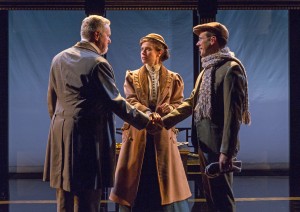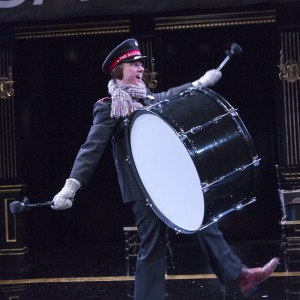For several years David Staller’s Project Shaw has been presenting monthly readings of the plays of George Bernard Shaw, whetting the appetites of fans of the Irish socialist. Widowers’ Houses, written in 1892 and now presented by TACT and Staller’s Gingold Theatrical Group in a full production, is the first of Shaw’s 65 plays, and it is astonishingly topical.
The plot is simple enough. On a Rhineland holiday, young Harry Trench (Jeremy Beck) and his companion Cokane (Jonathan Hadley) encounter bluff, social-climbing businessman Sartorius (Terry Layman), traveling to introduce his daughter, Blanche (Talene Monahon), to continental culture. The playwright’s satiric instincts are almost immediately on display, as Cokane, attempting to show his worldliness, mispronounces words like “distingué” and orders stones in fractured German.
But the humorous jabs at the class-conscious British belie the darker thrust of Shaw’s play. Here the playwright takes on tenement housing, society’s indifference to the poor, and the ruthlessness of businessmen—topics that still sizzle. Trench and Blanche strike romantic sparks, but Sartorius, while favoring their marriage, requires that his daughter, raised middle-class, will be accepted into the aristocracy: Trench is a doctor with limited income, but his family includes nobility. Sartorius has oodles of money, and essentially means to buy his daughter’s entry into the upper class.
Shaw introduces strong class friction to the business, exposing Sartorius as ruthlessly oppressing the poor. Reviewing the books on his real estate holdings, he discharges his toadying overseer, Lickcheese (a crestfallen John Plumpis), because he has bought wood to fix a dangerous staircase in a tenement.
The plot takes a darker turn when Trench, having rejected financial support from his prospective father-in-law, finds himself entangled in the very oppression of the poor for which he disdains Sartorius. In 1892, critics attacked Shaw’s portrayal of the businessman, and Shaw responded in a letter to The Star: “They denounce Sartorius … as a monstrous libel on the middle and upper classes because he grinds his money remorselessly out of the poor. But they do not (and cannot) answer his argument as to the impossibility of his acting otherwise under our social system.” Shaw’s assessment is still so clear-headed that it will make audiences think hard, if not squirm.
Under Staller’s direction, the actors do splendidly. The youthful Beck is by turns romantically besotted, appalled at the social implications of his alliance with Blanche, and helplessly trapped by Darwinian capitalism—and he delivers some pratfalls as well.
Shaw is not above borrowing the high style of his countryman Oscar Wilde, either; a scene of serving tea is played by Beck and Monahon with a casual archness, as if they were in The Importance of Being Earnest.
“Sugar, Dr. Trench?” asks Blanche, serving.
“Yes, please.”
“One or two?” she asks.
“I rely upon your better judgment,” says Trench.
“Quite right.”
For her part, Monahon starts as the cool object of Trench’s affection and slowly reveals herself as a “nasty little shrew,” as Max Beerbohm called her in a 1909 review. There’s a moment early on when, following Sartorius’s discussion about Trench’s marriage to his daughter, Blanche enters and seems to give a con man’s nod to her father; they have both fixed on Trench, it’s clear, and, if Blanche is unaware of the tenement incomes, she is in league with her father to marry well.
There are hints, too, that Cokane is a closeted homosexual. Apart from the flamboyance with which Hadley invests the character, there’s a telling moment when Trench, seeking Cokane’s help in writing a letter, curls his lip and pouts flirtatiously with his friend—a savvy heterosexual using his appeal to wheedle his gay chum for a favor.
Here and there Staller gives a textual boost to Shaw—an early joke depends on knowing a period brand of water that Staller clarifies. Later he substitutes a generic reference for “the North Thames Iced Mutton” company; the latter surely plays more comically in Britain than here. It’s symptomatic of the care Staller has invested, although the climactic moment seems the director’s own. Trench, having acquiesced to a business deal proposed by a newly thriving and conniving Lickcheese, is suddenly lighted garishly by Peter West as he hears snatches of dialogue from earlier in the play. He’s like a fly caught in a spider’s web. It’s a more overtly cynical note than in Shaw’s original, but the playwright might still have approved.
TACT and Gingold's Theatrical production of Widowers’ Houses plays through April 2 at the Beckett Theater in Theater Row, 410 W. 42nd St. off Ninth Avenue. Evening performances are at 7 p.m. Tuesday, 7:30 p.m. Wednesday and Thursday, and 8 p.m. Friday and Saturday. Matinees are at 2 p.m. Saturday and Sunday. Tickets are $63.25 and may be purchased by calling Telecharge at (212) 239-6262 or visiting www.telecharge.com.










